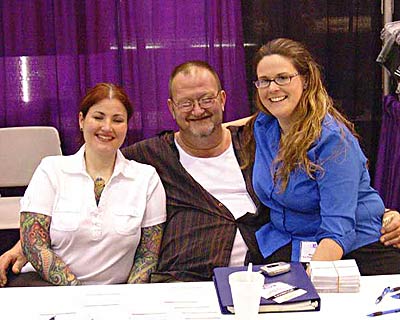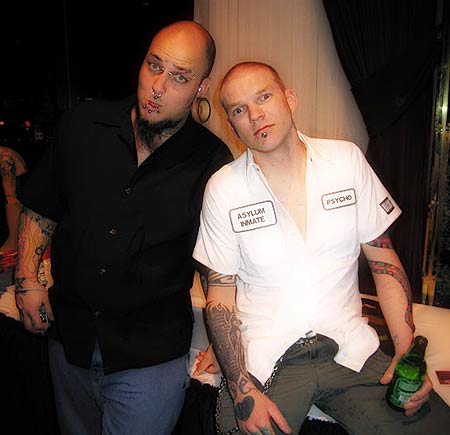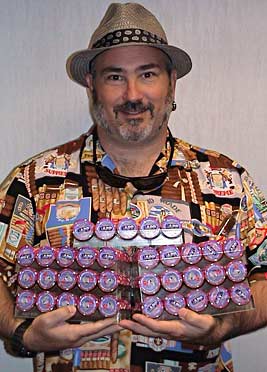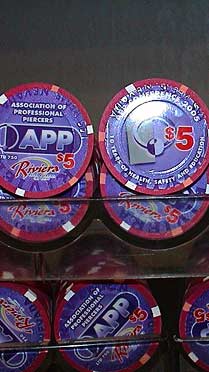APP 2005
(PART 2/5)
MONDAY
I kicked off my official coverage of the convention by visiting the Extreme Piercing Roundtable co-hosted by the admittedly conservative Jason King, owner of 23rd Street Body Piercing in Oklahoma City, and the admittedly Cuban Luis Garcia, piercer at NoKaOi Tiki Tattoo and Piercing. While I’d heard that this particular roundtable had, in the past, garnered some fairly intense discussion and included a large array of topics, I was slightly disheartened to find the general topic of choice to be surface piercing — a subject that would be receiving its own class later on in the week. That said, I was quite surprised to find that it was such a hot issue; maybe having been such a close follower of BME for so many years, I’m not really shocked or confused by much piercing-wise, and I just assume that this is the general rule with the rest of the community — funnily enough, I realized that in a way, I was the one that was out of the loop. Whether it was due to the locale being an APP convention or if this was actually truer across the industry as a whole than I’d imagined, I had to wonder: Is the piercing community more conservative than I thought?
(As the week went on, I found the answer, largely, to be a “no”.)
Aware that there was a surface piercing-specific seminar though, the focus was shifted to other “extreme” procedures; at one point, Jim Weber was called on to discuss the mechanics of the rare Princess Albertina (female urethral) piercing, which he is likely the leading practitioner of. Much to the surprise of most people, Jim conceded that altogether, the piercing is not all that difficult to do, though it is almost one hundred percent reliant on the person’s anatomy — though he personally has not had to turn many clients away, if any. While horizontal tongue and sub-clavicle piercings were briefly mentioned as well — the latter subject featuring comments from Mark Pantalone (IAM:Mark aka SICKTAT2S), arguably the first piercer to ever attempt the procedure — the too-short one hour class quickly came to an end with, in my opinion, not nearly enough ground covered.

Jim Weber discusses the Princess Albertina
(L-R: Jason King, Jim Weber, Luis Garcia, Phish Goldblatt)
After retiring to my hotel room just long enough to order an obscenely overpriced club sandwich from room service, I returned downstairs to sit in on a roundtable on the topic of Ethics in Apprenticeship, moderated by Elayne Angel, incoming APP Secretary Chrissy Shull, and incoming Treasurer Schane Gross (IAM:Vortex Sutra). It was during this class that a theme developed that I would continue to notice throughout the week; oftentimes, I found myself thinking, “It’s great that they’re teaching this”, but at the same time, I was incredulous that the audience members didn’t already know it! And really, I don’t mean that in an insulting way — it was just surprising that so many industry professionals weren’t aware of what I just assumed to be common knowledge and protocol. That said, the juxtaposition of the Extreme Piercing discussion and this one made me start to understand that the organization is really just as much about business management as it is about piercing; I think it’s safe to say that many people who dive headfirst into the business don’t consider all of the financial and planning aspects necessary in running a successful shop, and find themselves disappointed and wondering what went wrong after a short period of time.
Though not an official moderator, David Vidra of Health Educators Inc. did a lot of the talking. With extensive knowledge of the subject, he spoke at length about the importance and necessity of taking apprenticeship beyond the realm of informal training and to start treating it as another aspect of the business — from writing up clear documentation about what is being taught and having detailed contracts, to non-compete agreements, to whether or not apprentices should be paid or if they should be the ones paying. Speaking about the legal importance of keeping close track of one’s apprenticeship program: “If you don’t document it,” he says, “it never happened.”
 Chrissy Shull told the story of her initial “apprenticeship” in New Mexico — a weeklong course that she paid an absurd $2,000 for — that left her with little more than a set of dangerous under-qualifications and a crippled bank account; the facilitators of her apprenticeship — who she did not name — were subsequently taken to court and forced to pay damages to many people who had taken their course, often totaling far more than their students had paid in initial fees. This is the sort of activity that the APP wants to eliminate; it began to resonate more with me that this was not so much an elitist organization as one with a clear set of ideals and standards that it legitimately believes will benefit the industry as a whole. With stories like Chrissy’s being more common than anyone would like to admit, it’s hard to argue with them, and governments are starting to get involved as well; according to Vidra, anyone in the state of Arizona seeking to offer a piercing apprenticeship must now register as an actual institution of post-secondary education. Overboard as it may seem, this is undoubtedly the wave of the future; if the piercing industry wishes to continue to legitimize itself in the eyes of officiating bodies, it is going to have to establish itself as the trade that it is — and that may very well include instituting officially recognized trade schools.
Chrissy Shull told the story of her initial “apprenticeship” in New Mexico — a weeklong course that she paid an absurd $2,000 for — that left her with little more than a set of dangerous under-qualifications and a crippled bank account; the facilitators of her apprenticeship — who she did not name — were subsequently taken to court and forced to pay damages to many people who had taken their course, often totaling far more than their students had paid in initial fees. This is the sort of activity that the APP wants to eliminate; it began to resonate more with me that this was not so much an elitist organization as one with a clear set of ideals and standards that it legitimately believes will benefit the industry as a whole. With stories like Chrissy’s being more common than anyone would like to admit, it’s hard to argue with them, and governments are starting to get involved as well; according to Vidra, anyone in the state of Arizona seeking to offer a piercing apprenticeship must now register as an actual institution of post-secondary education. Overboard as it may seem, this is undoubtedly the wave of the future; if the piercing industry wishes to continue to legitimize itself in the eyes of officiating bodies, it is going to have to establish itself as the trade that it is — and that may very well include instituting officially recognized trade schools.
Finishing up the day was yet another roundtable discussion, this one on the topic of How and Why to Become an APP Member, led by Jim Weber and Chrissy Shull. For the amount of non-members present at the convention, it was a shame to see such a lackluster turnout — perhaps the end of the first official day was not the best timeslot for arguably one of the more important discussions for people to take part in. With the majority of those present already being members, it was essentially a lot of backslapping and self-validation, with not enough discourse about why people aren’t joining and how membership can be made more attractive and, thus, increased. I don’t blame those running the discussion, mind you, but this portion of the day definitely wasn’t what it could have been. The atmosphere was like one of the final days of the school year, when only a fifth or so of the class shows up, so the teacher just lets everyone sit around playing card games and reading magazines, and you don’t have to ask permission to go to the bathroom. That said, I certainly felt myself starting to come around; I wasn’t sending in my check to gain “member at large” status just yet, but some of my initial concerns about the organization were being demystified — which is not to say that I don’t think those complaints weren’t accurate at one point, but rather, that perhaps they weren’t anymore.

Mark Pantalone and H�ave
In lieu of attending the official opening party that evening, Shannon, Rachel, Allen, Jen and I had made plans to see Penn & Teller perform at the Rio, where, accompanied by H�ave (IAM:bleeding) and Christiane (IAM:Christiane), we first had dinner at their sprawling buffet. Coming from Norway, this was H�ave and Christiane’s first visit to America, much less Las Vegas, which is kind of like being christened with fire. That said, both H�ave and Christiane were wonderful, though I admittedly have a love of Norwegians and, by extension, most Scandinavians, if for no other reason than that the majority of them speak more proper, eloquent English as a second or third language than many North Americans do as their first.
(That, and the fact that to them, heavy metal is serious — church-burningly serious.)
As for Penn & Teller, I wasn’t all that impressed. Yes, they were taking the piss out of traditional Vegas shows, and yes, they were edgy to an extent, and yes, they even performed some semi-dangerous tricks ... but by and large, it was all style and little substance — and that style consisted mainly of a lot of long-windedness and repetitive dialogue.
Back at the hotel, I called it a night fairly early, but still laid awake for hours watching the same NBA playoff and baseball highlights on ESPN over and over, occasionally checking out other late night options. Again, I don’t get to watch television in Mexico, so this was more exciting than it probably sounds.
(When did Conan O’Brien start broadcasting in high-definition? I hope that becomes a trend; I like my time-wasting, brain cell-killing activities to have the most vivid colors and well-defined edges possible.)
 
Gus was very pleased with his APP chips!
Comments? | Main APP index | Next Part: Tuesday

A recent acquisition from the illustrious, high-profile world of low-budget
sporting-goods photography, Jordan Ginsberg is a Toronto native. Born
affiliated to the Levi tribe, Jordan renounced his religion shortly before
his Bar Mitzvah but still believes he is entitled to a role in the liberal
Jew-run media and sees BME as an ideal stepping stone. Votes left, throws
right.
Article copyright © 2005 BMEZINE.COM. First published May 17th, 2005 in La Paz, BCS, Mexico. Requests to reprint must be confirmed in writing.
|






